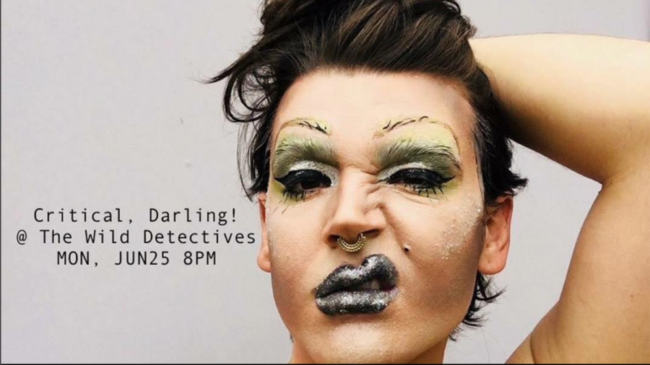Pop anthems including Ariana Grande’s “Break Free” and Zendaya’s “Replay” blasted in the outdoor space of The Wild Detectives café Monday evening, as Brigham Mosley posed for selfies with fans before his solo drag show, “Critical, Darling!”
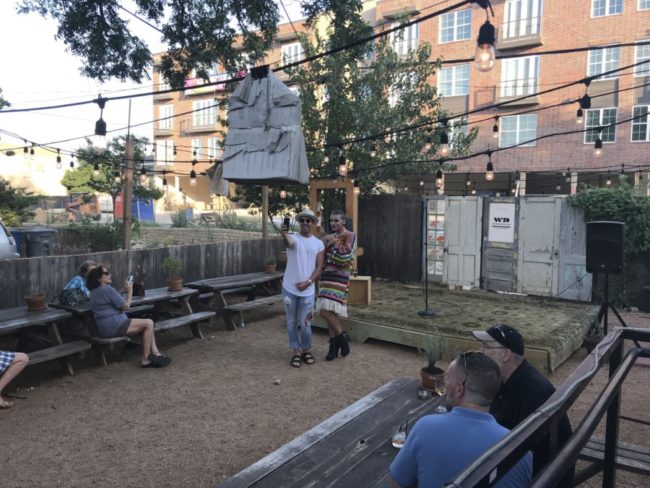
Mosley is a graduate of the SMU Division of Theatre, receiving his B.F.A. in 2010. Speaking with Mosley, he noted that Professor Stan Wojewodski introduced him to the work of solo performance artists that would later inspire his work, and that Professor Rhonda Blair’s solo performance class was a pivotal course for Mosley, helping him evolve into the performer that he is today.
Mosley also reflected, “I was a small-town kid from southwest Oklahoma, and came to SMU and you know every acting professor was like, “You need to be a leading man; you need to butch it up. Act straight.” And all these things that I didn’t know how to do and wasn’t interested in doing, and Rhonda was essentially like, ‘Here’s this whole other medium within theater.”’
https://www.instagram.com/p/BkakcMRFxMz/?hl=en&taken-by=thewilddetectives
According to his website, Mosley currently brands himself as a “writer/performer/sometime drag queen.” He is a founding member of Dallas’s The Tribe, which won the 2016 Dallas Observer Mastermind Award. Mosley was also named a 2016 Queer Local of the Year by The Dallas Voice. His work has been produced by prestigious institutions such as PS122, La MaMa, Dixon Place and The New Museum.
Currently, Mosley is developing a piece on journalism commissioned by Ignite Arts Dallas for the Dallas Morning News, and he is also continuing work on his drag-musical series, “Movies That Should Be Musicals.”
Mosley developed this show exploring the dichotomy of being both critical and darling at a 5-week writer’s residency in Corsicana. On his initial thoughts for the show, Mosley noted, “I knew that it would be about identity politics, with songs, and that it would be sort of social critique along with like impulse to find sanctuary with the world being so terrible right now.” Within this multi-faceted framework, Mosley also revealed that along with his thoroughly rehearsed performance, the show continues to grow and evolve each time that Mosley performs it, as he adjusts sections to better convey his message.
“So often theatre especially, but really in any of the arts, it’s liberal people talking to liberal people probably about conservative people, and I feel like there is a lack of critique on our own tribe and I think as a queer person, as a liberal person, we have to be our own mirror as well.”
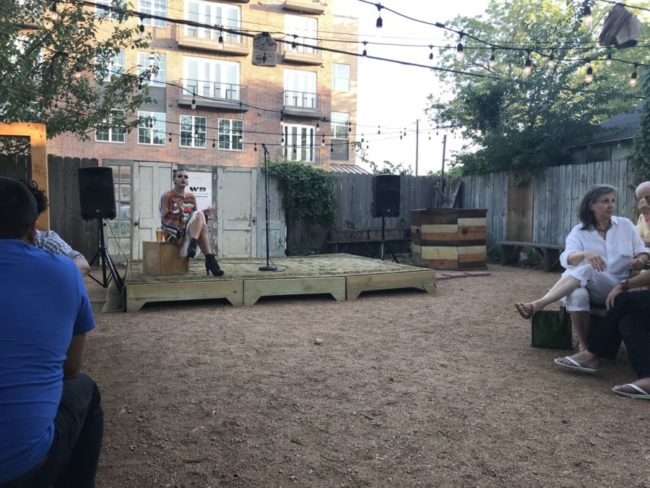
Mosley also explained that the root of the meaning of the show could actually be found in the title. He continued to explain that through the “blown-up” persona that he creates through his drag look, which he describes as an “androgynous sexfull thing that gets to be both male and female,” Mosley explores the idea of being both critical and being darling, “giving value to preciousness and safety and childhood in a way that wouldn’t be cutesy and wouldn’t be sentimental” combining this component with the “idea of critical and being able to be barbed and tarring and feathering some things.”
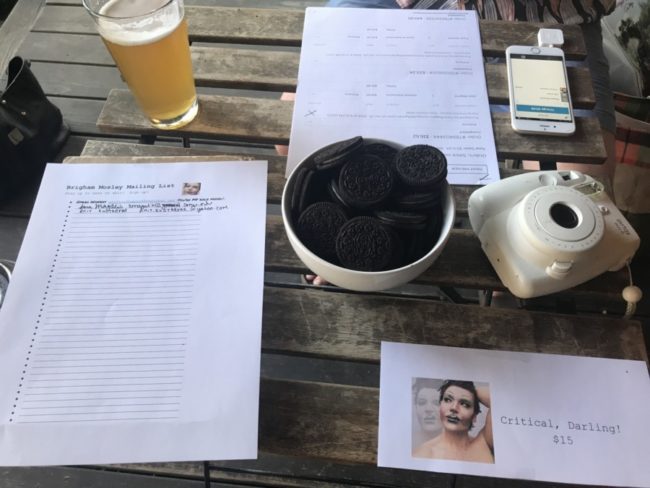
As Mosley worked to marry these contrasting elements in a fast-paced, witty and humorous 45-minute show, his husband, Zac Hammer, received periodic glimpses into Mosley’s process throughout the show’s creation. Hammer spoke enthusiastically about the show as he worked at a small table, selling tickets and enticing patrons to sign up for Mosley’s email newsletter with the “special promotion” of a free Oreo cookie. Hammer is also an SMU graduate, but from the Division of Dance, and has served as an adjunct dance professor, making him no stranger to the creative process.
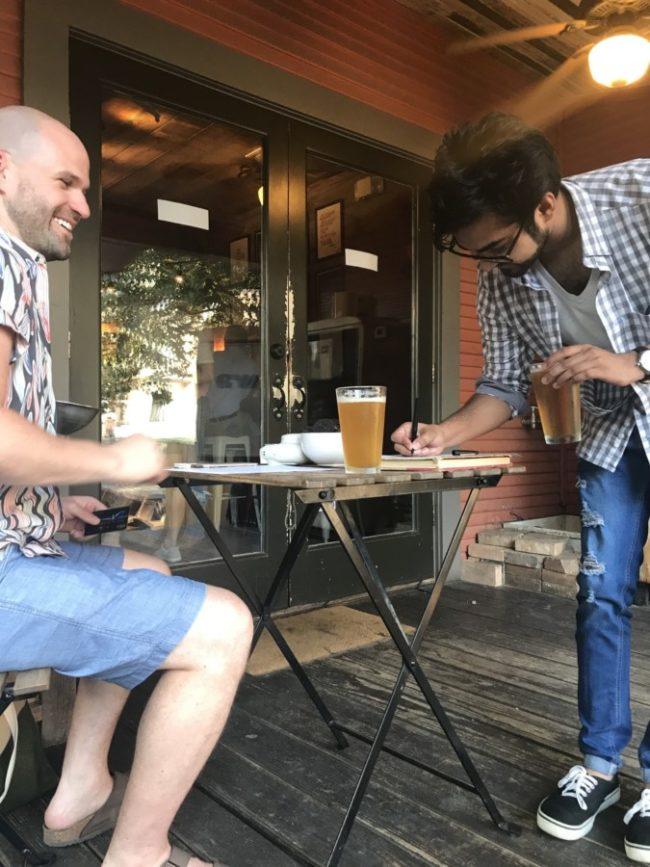
“The world can feel dangerous, especially right now,” Hammer said. “We are very politically divided. People are yelling a lot and everyone is in a constant state of victimhood.” Despite this, Hammer stated that through this show and through most of Mosley’s current work he has a goal to, “create this place where people can come and feel the coziness of what he calls his “pillow fort,” that there can be an inclusivity and a place that feels like home.” Hammer believes that this method of welcoming the audience as equal participants allows Mosley to explore “potentially politically divisive themes” in a manner that doesn’t isolate people, but instead allows for a more open exchange of thoughts.
As Mosley opened the show, he began by reminiscing about standout moments in his childhood, including a love note he found from a female classmate in the second grade, which he admitted still makes him uncomfortable at 30 years old, and the pillow fort that he would make for himself in his home. Mosley revealed these memories through speech and song, and even diverted from his script to engage in playful banter with an enthusiastic bird that chirped incessantly as he performed, eliciting a chorus of laughter when he thanked Mother Nature for coming out to see the show. Mosley reflected on his memory of sitting in his pillow fort, “I am happy an safe and in my homemade house in the center of my house. How do we make that feeling last forever?”
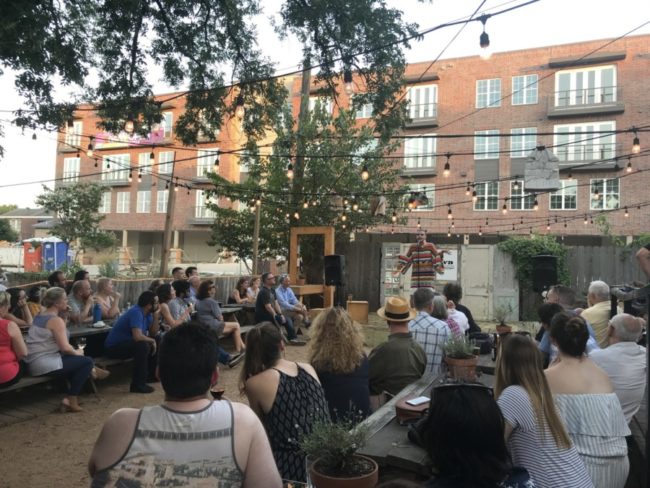
Mosley also talked about topics that affect society today, including being constantly bombarded by news of heinous acts of violence through digital media, the current cultural obsession with nostalgia manifested in constant movie remakes, fashion trend resurgences, and celebrity look-alikes, and our debilitating dependence on cellphones.
“Think about when you leave your phone somewhere, that God-shaped hole in your heart that the phone now occupies. What was in that hole before we all got text messaging. Maybe confidence? A sense of humor that didn’t rely on self-deprecation? Maybe more than one memory from the second grade? What did we give up?”
One of the most dramatic elements of the show involved a song in which Mosley used a spray bottle to mimic rain falling on a rejected fan of Marlon Brando, who had been kicked out of his home after Brando lost interest in her delusions that he was Jesus himself reincarnated. Half way into his impersonation of the celebrity stalker through a rendition of Bruno Mars’ “Locked out of Heaven,” Mosley’s spray bottle handle broke, but he didn’t miss a beat. Mosley continued to sing while unscrewing the entire lid, and then improvised by pouring water into his hand and throwing it on his face, making the already comical scene even more dramatic.
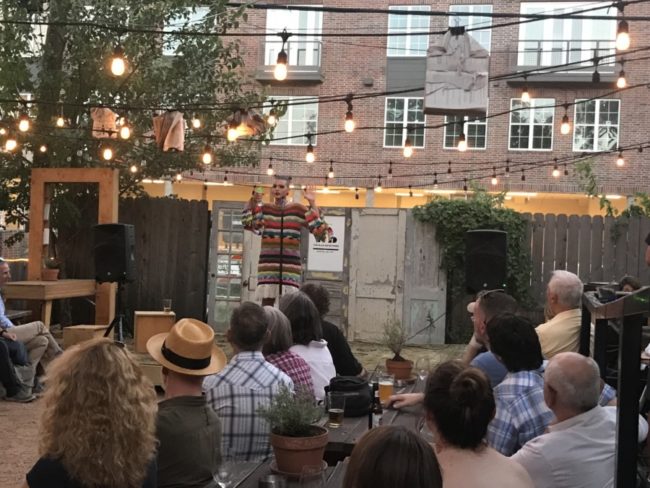
Mosley concluded the evening by discussing current patterns of victimization and compartmentalization of marginalized groups through a “politics of identity,” or “tap dance of victimization.” Mosley continued, “Why are we rushing down aisles to be pitied? Why are we consciously seeking out slights and discriminations? In order to have material for a really juicy tweet? A really provocative Facebook post?”
After this more critical section, Mosley transitioned into a more optimistic song. As he sang his final lines, “Come into my pillow fort, I’m so glad you’re here,” the audience erupted into enthusiastic applause, giving Mosley a standing ovation. Keeping with the conversational vibe of the performance, Mosley quickly jumped off the stage to mingle with the audience, hugging audience members and toasting to a successful show.
One of the audience members who stayed to mingle was Matthew Manelli, a rising junior in the SMU Division of Theatre. Manelli applauded the show, calling it a “creative and fun exploration of what safety is and why the contemporary world can make us feel unsafe.” As Manelli and his fellow SMU theatre peers chatted excitedly with Mosely, it was evident that the alumus had resonated with the younger members of the SMU theatre community.
As Mosley interacted with his audience, it became clear as to why the actor considers the Wild Detectives performance space his “theatrical home,” where he can perform for not just theatre-goers, but for a wide variety of arts enthusiasts, whose diversity inspires Mosley to push the boundaries of his writing and performing, all while balancing the unpredictable sounds of the surrounding Bishop Arts District. Mosley certainly appeared at home at the conclusion of his show, as he seamlessly transitioned from his larger-than-life drag persona to simply another member of the Wild Detectives family, enjoying a beer and conversing with other patrons about their mutual love for the arts.



